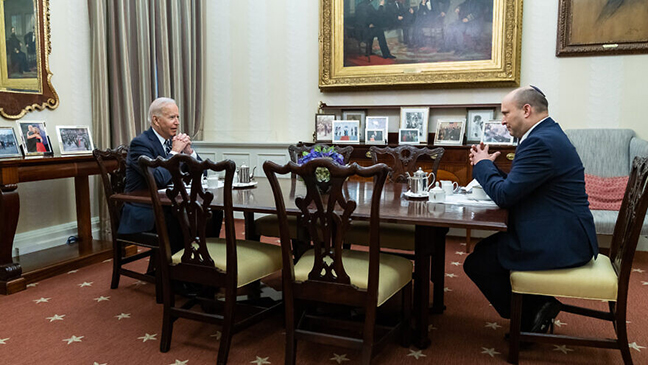Biden’s record on Israel as president: So far, so good

U.S. President Joe Biden with Israeli Prime Minister Naftali Bennett in the Roosevelt Room at the White House on Aug. 27, 2021. Source: Embassy of Israel/Twitter
by Mitchell Bard
During the 2020 campaign and since he became president, conservatives have attempted to paint Joe Biden (and the entire Democratic Party) as hostile to Israel. I was among those who expressed concerns about some of Biden’s views and appointments, and believe some of his decisions have been ill-advised. But, so far, he has been very good for Israel.
Trump supporters who constantly talk about how the former president was the most pro-Israel president — and, in many ways he was — conveniently forget many of the actions he took that were harmful to Israel (remember how he revealed an Israeli intelligence operation in Syria to the Russians).
When it comes to President Biden, let’s start with his most recent decision to provide $1 billion to replenish Iron Dome stocks. If I’m not mistaken, this would be the largest supplemental aid package for Israel since the emergency aid package during the Yom Kippur War. The legislation must still pass the Senate, but the House approved it by a vote of 408-9 — and, notably, 85 out of 95 of the supposedly anti-Israel progressive caucus members voted yes. While the political right made a big deal out of progressives preventing the aid from being included in the stopgap spending bill, they’ve said nothing about Republican Rand Paul (R-KY) preventing approval of the aid by unanimous consent in the Senate, aside from the Republican Jewish Coalition.
Biden has repeatedly expressed his “ironclad” support for Israel, and, in his recent meeting with Israeli Prime Minister Naftali Bennett, said the U.S.-Israel relationship is “as strong as can be.” Tensions with the Democrats that arose during Benjamin Netanyahu’s tenure have eased, and Bennett has restored Israel’s image as bipartisan.
The most serious concern about Biden was his determination to return to the catastrophic Iran nuclear deal (JCPOA). The president reiterated his views to Bennett while also pledging to prevent Iran from developing a bomb, and saying that if diplomacy failed, he was “ready to turn to other options.”
The administration has been indirectly negotiating with Iran, but has not returned to the deal or eased sanctions (except for those related to former senior National Iranian Oil Co. officials and several companies involved in shipping and trading petrochemical products). Secretary of State Antony Blinken, meanwhile, has expressed growing skepticism about returning to the JCPOA, as Iran has continued to violate the agreement, and Iran’s new foreign minister declared that Tehran will not sign the “longer and stronger” deal Biden has said he wants.
While I supported leaving the JCPOA and Trump’s “maximum pressure” campaign, we can’t ignore the fact that it did not have the desired effect and that Iran is now closer to building a bomb. For all his bellicose rhetoric, Trump was not willing to attack Iran even after Tehran ignored his warning not to attack U.S. forces. Trump launched just one missile strike, and not until his last year in office, on pro-Iranian forces in Iraq; the rest was bluster.
Biden has already ordered a missile strike on Iran-backed militias on the Iraqi-Syrian border. Nevertheless, I am doubtful that he will use military force directly against Iran. Without the use of force, I don’t believe Iran’s nuclear project can be stopped. Israel’s Defense Minister Benny Gantz surprisingly said he could accept “the current US approach of putting the Iran nuclear program back in a box,” but hoped to see a “viable” plan B, which would require the United States to convince Europe, Russia, and China to apply political, diplomatic, and economic pressure on Iran “if negotiations fail.” Clearly, he is also skeptical that Biden will do what is necessary and therefore Israel has a “plan C” — undoubtedly a military response — as a last resort.
Biden’s biggest test to date was during Operation Guardian of the Walls. Even some of Israel’s best friends in the White House have publicly criticized past Israeli military actions; however, Biden did not.
The Wall Street Journal reported that even after Israel was pilloried in the media for bombing the building that housed the headquarters of the Associated Press, which turned out to be a base of Hamas intelligence operations, the administration made “a very conscious decision not to cross the Israelis in public,” having learned from the mistakes of President Barack Obama. Biden also blocked resolutions against Israel in the UN Security Council.
Not surprisingly, one of the architects of some of Obama’s most disastrous policies, Ben Rhodes, defended his former boss, saying the U.S. should “be able to share its views publicly when it sees children being killed.” By contrast, the first thing Biden said after fighting began, and later reiterated, was that “Israel has a right to defend itself when you have thousands of rockets flying into your territory.”
Instead of flogging Israel publicly, the administration used quiet diplomacy to help achieve a ceasefire. Afterward, Biden said, “There is no shift in my commitment to the security of Israel. Period.” He added, “Let’s get something straight here: Until the region says equivocally [sic] they acknowledged the right of Israel to exist as an independent Jewish state, there will be no peace.”
By all accounts, the meeting with Bennett went well. A few weeks later, Biden refused to meet with Mahmoud Abbas. That, combined with resisting the temptation to plunge into a fruitless peace process, is another indication he learned from Obama’s mistakes, and that he is indeed committed to strengthening the U.S.-Israel relationship.
Critics have accused Biden of sabotaging the Abraham Accords, and showing no interest in expanding them. No other Arab countries have joined, but there’s no evidence that is for lack of trying. In the meeting with Bennett, Biden “expressed his full support for strong and expanding relations among Israel, its Arab neighbors, and Muslim states globally” and “discussed ways to further deepen Israel’s relationships with Bahrain, Morocco, Sudan, and the United Arab Emirates, and their goal of new opportunities to expand such partnerships.” Secretary of State Blinken subsequently held a ceremony to mark the one year anniversary of the signing of the Accords, with the ambassador to the United States of Bahrain and the foreign ministers of Israel, the UAE and Morocco.
Biden has made some ill-advised decisions, in particular the return to the Human Rights Commission, a resumption of aid to UNRWA and the Palestinians, and the push to reopen the Palestinian consulate in Jerusalem. None of these decisions are “anti-Israel”; they are simply a return to the status quo before Trump. As administration officials say, being at the HRC does give the U.S. a voice that it lost when it left, albeit one that did nothing to stop the demonization of Israel. As far as aid, Israel has historically supported funding UNRWA for lack of a better alternative, as well as aiding the Palestinian Authority, in the hope that bolstering the economy will pacify the population. The Israeli government recently agreed to assist the PA as well by providing a loan. Israel also did not object to the consulate in Jerusalem for more than 70 years, and won’t be harmed if it reopens — though it would still make more sense to open it in Ramallah.
As I noted in an earlier column, Biden’s foreign policy is self-defeating and could be dangerous for Israel. The withdrawal from Afghanistan will embolden Islamists, for example, but it is important to remember that it was Trump who signed the agreement with the Taliban terrorists, and it was his promise to withdraw all U.S. troops, along with his redeployment of forces from Syria (along with Obama’s), that reinforced the belief of Muslim extremists that they can outlast American commitments.
Appointing Jews to key positions is no guarantee an administration policy will be good for the Jews or Israel. I’ve already written about problems with the Obama retreads. Still, in just the last few weeks, Biden appointed Jews to be ambassadors to Argentina, Japan, Singapore, Belgium, the EU, Canada and India. Most important, he also chose a pro-Israel Jew, Thomas Nides, as ambassador to Israel. Also important, unlike Trump, who took two years to appoint a Special Envoy for Monitoring and Combating Anti-Semitism, Biden nominated Deborah Lipstadt for the position in July. An authority on the Holocaust, Lipstadt should be an able successor to the superlative Elan Carr, and is much needed in the current climate.
I don’t expect the right-wingers whose blind hatred for Democrats in general, and Biden in particular, will acknowledge any of the positive steps I’ve outlined here. Still, Biden deserves credit for his stewardship of the relationship with Israel so far. If he goes astray, you can be sure you’ll read about it here.
Mitchell Bard is a foreign-policy analyst and an authority on U.S.-Israel relations who has written and edited 22 books, including “The Arab Lobby,” “Death to the Infidels: Radical Islam’s War Against the Jews,” and “After Anatevka: Tevye in Palestine.”



